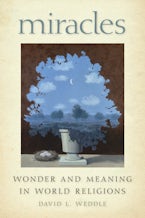Miracles
Wonder and Meaning in World Religions
Despite the dominance of scientific explanation in the modern world, at the beginning of the twenty-first century faith in miracles remains strong, particularly in resurgent forms of traditional religion. In Miracles, David L. Weddle examines how five religious traditions—Hinduism, Judaism, Buddhism, Christianity, and Islam—understand miracles, considering how they express popular enthusiasm for wondrous tales, how they provoke official regulation because of their potential to disrupt authority, and how they are denied by critics within each tradition who regard belief in miracles as an illusory distraction from moral responsibility.
In dynamic and accessible prose, Weddle shows us what miracles are, what they mean, and why, despite overwhelming scientific evidence, they are still significant today: belief in miracles sustains the hope that, if there is a reality that surpasses our ordinary lives, it is capable of exercising—from time to time—creative, liberating, enlightening, and healing power in our world.
Contributor Bios
Reviews
"Combines extensive comparative knowledge and understanding of major religious traditions with solid grounding in diverse modern philosophical understandings. Weddle argues that miracles do not go away under challenges from modern rational skepticism. Rather, they persist vigorously across the landscape of human experience and belief as & occasions of wonder." ~ Frederick M. Denny,Professor Emeritus of Islamic Studies and History of Religions, University of Colorado at Boulder
"In Miracles: Wonder and Meaning in World Religions, David L. Weddle examines miracle stories from Hinduism, Judaism, Buddhism, Christianity, and Islam, explaining their significance in the context of those faith traditions and why they play such a pervasive role in religious belief." ~ Kacie Glenn, Chronicle Review
"Provides a rich discussion of divine intervention as recounted in the traditions of the major world religions, East and West. A perfect text for a World Religions course, each chapter presents well chosen representative miracle narratives together with their interpretations in relation to the major thrust of the religion's teachings. This careful contextualization serves as a foundational text by supplying a fascinating lens through which to view the major theological tenets and sensibilities of each religious tradition." ~ Wendy Cotter,author of The Miracles of Greco-Roman Antiquity: A Sourcebook
 This work is licensed under a
Creative Commons Attribution-NonCommercial-ShareAlike 4.0 International License
(CC BY-NC-SA).
This work is licensed under a
Creative Commons Attribution-NonCommercial-ShareAlike 4.0 International License
(CC BY-NC-SA).


